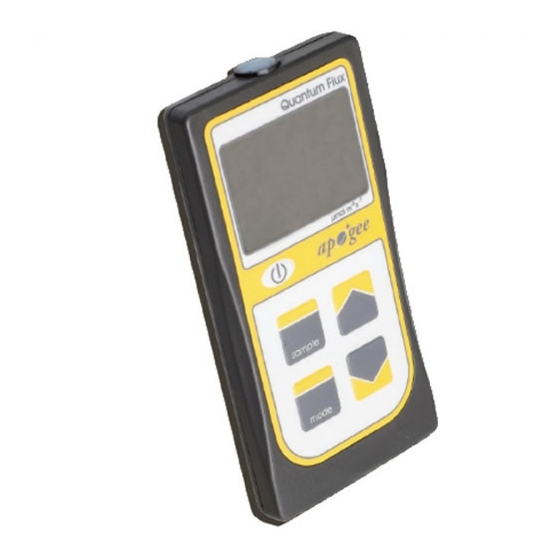
Table of Contents

Subscribe to Our Youtube Channel
Summary of Contents for Apogee MQ-100
-
Page 1: Owner's Manual
OWNER’S MANUAL QUANTUM METER Models MQ-100, MQ-200, and MQ-300 Series APOGEE INSTRUMENTS, INC. | 721 WEST 1800 NORTH, LOGAN, UTAH 84321, USA TEL: (435) 792-4700 | FAX: (435) 787-8268 | WEB: APOGEEINSTRUMENTS.COM Copyright © 2016 Apogee Instruments, Inc. -
Page 2: Table Of Contents
TABLE OF CONTENTS Owner’s Manual ..........................................1 Certificate of Compliance ....................................3 Introduction ..........................................4 Sensor Models ......................................... 5 Specifications ........................................... 6 Deployment and Installation ....................................9 Operation and Measurement ................................... 10 Maintenance and Recalibration ..................................14 Troubleshooting and Customer Support..............................15 Return and Warranty Policy .................................... -
Page 3: Certificate Of Compliance
(PBB), polybrominated diphenyls (PBDE). Further note that Apogee Instruments does not specifically run any analysis on our raw materials or end products for the presence of these substances, but rely on the information provided to us by our material suppliers. -
Page 4: Introduction
Apogee Instruments MQ series quantum meters consist of a handheld meter and a dedicated quantum sensor that is integrated into the top of the meter housing (MQ-100) or connected by cable to an anodized aluminum housing (MQ-200 and MQ-300 series). Integrated and separate sensors consist of a cast acrylic diffuser (filter), photodiode, and are potted solid with no internal air space. -
Page 5: Sensor Models
Line quantum meters, MQ-300 series, provide spatially averaged PPFD measurements. All sensors along the length of the line are connected in parallel, and as a result, Apogee line quantum meters display PPFD values that are averaged from the location of the individual sensors. -
Page 6: Specifications
(high water resistance, high UV stability, flexibility in cold conditions) Calibration Traceability Apogee MQ series quantum meters are calibrated through side-by-side comparison to the mean of four Apogee model SQ- 110 or SQ-120 transfer standard quantum sensors under high output T5 cool white fluorescent lamps. The transfer standard quantum sensors are calibrated through side-by-side comparison to the mean of at least three LI-COR model LI-190R reference quantum sensors under high output T5 cool white fluorescent lamps. - Page 7 Spectral Response Mean spectral response of six SQ series quantum sensors (error bars represent two standard deviations above and below mean) compared to PPFD weighting function. Spectral response measurements were made at 10 nm increments across a wavelength range of 300 to 800 nm in a monochromator with an attached electric light source.
- Page 8 Cosine Response Directional, or cosine, response is defined as the measurement error at a specific angle of radiation incidence. Error for Apogee SQ series quantum sensors is approximately ± 2 % and ± 5 % at solar zenith angles of 45° and 75°, respectively.
-
Page 9: Deployment And Installation
DEPLOYMENT AND INSTALLATION Apogee MQ series quantum meters are designed for spot-check measurements, and calculation of daily light integral (DLI; total number of photons incident on a planar surface over the course of a day) through the built-in logging feature. To accurately measure PFFD incident on a horizontal surface, the sensor must be level. -
Page 10: Operation And Measurement
OPERATION AND MEASUREMENT MQ series quantum meters are designed with a user-friendly interface allowing quick and easy measurements. To power the meter, slide the included battery (CR2320) into the battery holder, after removing the battery door from the meter’s back panel. The positive side (designated by a “+” sign) should be facing out from the meter circuit board. Press the power button to activate the LCD display. - Page 11 LCD is 0.90 and 0.89 for sunlight and electric light measurements, respectively. The weighting functions for PPFD and YPFD are shown in the graph below, along with the spectral response of Apogee quantum sensors. The closer the spectral response matches the defined PPFD or YPFD spectral weighting functions, the smaller spectral errors will be.
- Page 12 Apogee quantum sensors (sensor sensitivity to different wavelengths of radiation). Spectral Errors for PPFD and YPFD Measurements with Apogee MQ Series Quantum Meters Radiation Source (Error Calculated Relative to Sun, Clear Sky) PPFD Error [%] YPFD Error [%]...
- Page 13 Underwater Measurements and Immersion Effect When a quantum sensor that was calibrated in air is used to make underwater measurements, the sensor reads low. This phenomenon is called the immersion effect and happens because the refractive index of water (1.33) is greater than air (1.00).
-
Page 14: Maintenance And Recalibration
MAINTENANCE AND RECALIBRATION Moisture or debris on the diffuser is a common cause of low readings. The sensor has a domed diffuser and housing for improved self-cleaning from rainfall, but materials can accumulate on the diffuser (e.g., dust during periods of low rainfall, salt deposits from evaporation of sea spray or sprinkler irrigation water) and partially block the optical path. -
Page 15: Troubleshooting And Customer Support
Error codes will appear in place of the real-time reading on the LCD display and will continue to flash until the problem is corrected. Contact Apogee if the following fixes do not rectify the problem. Err 1: battery voltage out of range. Fix: replace CR2320 battery and perform master reset. - Page 16 Conversion factors for common radiation sources can be found on the Unit Conversions page in the Support Center on the Apogee website (http://www.apogeeinstruments.com/unit-conversions/).
-
Page 17: Return And Warranty Policy
RETURN AND WARRANTY POLICY RETURN POLICY Apogee Instruments will accept returns within 30 days of purchase as long as the product is in new condition (to be determined by Apogee). Returns are subject to a 10 % restocking fee. WARRANTY POLICY... - Page 18 5. Upon receipt, Apogee Instruments will determine the cause of failure. If the product is found to be defective in terms of operation to the published specifications due to a failure of product materials or craftsmanship, Apogee Instruments will repair or replace the items free of charge.
















Need help?
Do you have a question about the MQ-100 and is the answer not in the manual?
Questions and answers